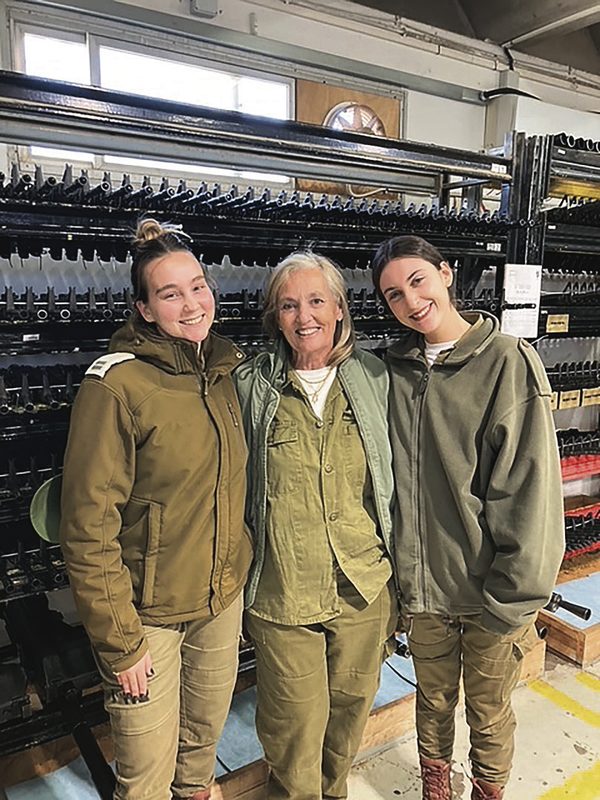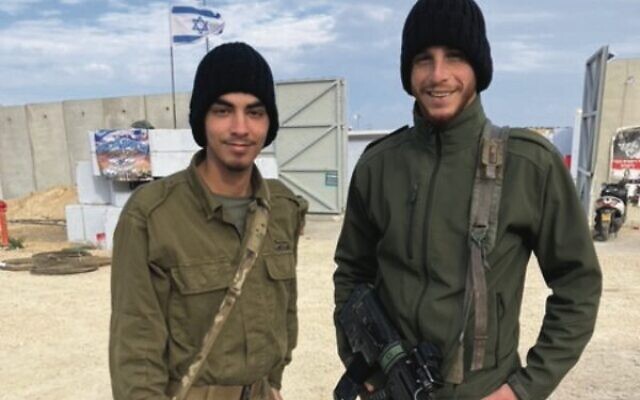Volunteering with Sar-El shows solidarity
“I also wanted to show solidarity with my fellow Jews in Israel and show them that the Jews in the Diaspora had not abandoned them but were 100 per cent behind them,” says Liz Pinczewski.
Liz Pinczewski was pasting posters of kidnapped hostages to walls in the middle of the night and felt she had to get her hands dirty and actively make a difference.
“I also wanted to show solidarity with my fellow Jews in Israel and show them that the Jews in the Diaspora had not abandoned them but were 100 per cent behind them.”
She went to Israel in January as a Sar-El volunteer to assist on IDF bases in a logistical support role.
“With antisemitism suddenly becoming legitimised and openly demonstrated, Israel is the only place where I do not feel I have to defend myself because I am a Jew. Currently, I feel safer in Israel than I do in Australia.”
She travelled with a donated suitcase filled with 12 dozen hand-knitted woollen beanies made by Australian women. Many of them had notes inserted inside giving love and prayers for the recipient. Pinczewski handed over the beanies at Sufa Military outpost.
“The soldiers were so grateful to receive them; they represented a meaningful symbol of the support and thoughts from the other side of the world,” she said. She also had a suitcase from Sydney charity Operation Golda, filled with essentials to be given to one of the 130,000 evacuees in Israel.
Her Sar-El group of 29 volunteers, mostly Canadians, French, a couple of Germans and Americans, and a lone Australian in her late 60s, was posted to Hatzerim on the outskirts of Beersheva.
“Our job was to pack boxes of food on an assembly line, and we were very proud at the end of the day to be told 6000 meals went to the IDF fighting in Gaza that day.”

The boxed food was basic, things like canned tuna, tahini, chocolate spread, Bissli, pita bread, canned olives, and noodles in a cup.
The American volunteers said when US soldiers received meals in the field opening the lid created an exothermic reaction that heated the food.
A couple of young Israeli soldiers confided they activated their “noodles in a cup” with hot water while they had a shower.
The volunteers’ accommodation on the base had been donated by an American charity. Two large tents had artificial turf on the ground, were big enough to accommodate 16 double bunks each and had air-conditioning and ensuite bathrooms.
“It was luxury in the Negev,” Pinczewski said.
She emphasised that every single soldier she met during her two weeks in Israel made her proud, most were aged between 19 to 23.
“They were confident young people who knew their duty and knew the risks. They had all lost someone close on or since October 7 and yet when they received their Order Eight [call up] notice these young people massed from around the world. It wasn’t easy to return to Israel. Flights from most airlines were cancelled or full, yet they made it back to Israel from wherever or whatever they were doing.”
At the end of her first week, she went to a barbecue at the IDF base in Alumim. “I learned later the Alumim kibbutz next to the base was between Be’eri and Kfar Aza, less than two kilometres from the Gaza border. We drove along the infamous Route 232 which was the road to the Nova dance party. Route 232 has now been renamed Kvish haDamim or the Road of Blood.”
She helped distribute another batch of more than 200 beanies to the soldiers and that evening she helped grill hundreds of hamburger patties, steaks and chicken pieces.
“Grilling for Israel” is a mother-and-son initiative that calls for volunteers to help make a special hot meal for the soldiers on active duty to thank them and show solidarity. There were cakes, salads, soft drinks and bread, all kosher, all donated and all appreciated.
Around a dozen young women were visiting from a yeshivah in New York and they helped to brighten the night that ended with the soldiers forming a large circle and singing and dancing.
“After a brief break over Shabbos, I joined Sar-El for my second week with a different group of volunteers.
“Before I knew it I was back on the plane to Australia, wishing I had signed up for a longer period.”


comments